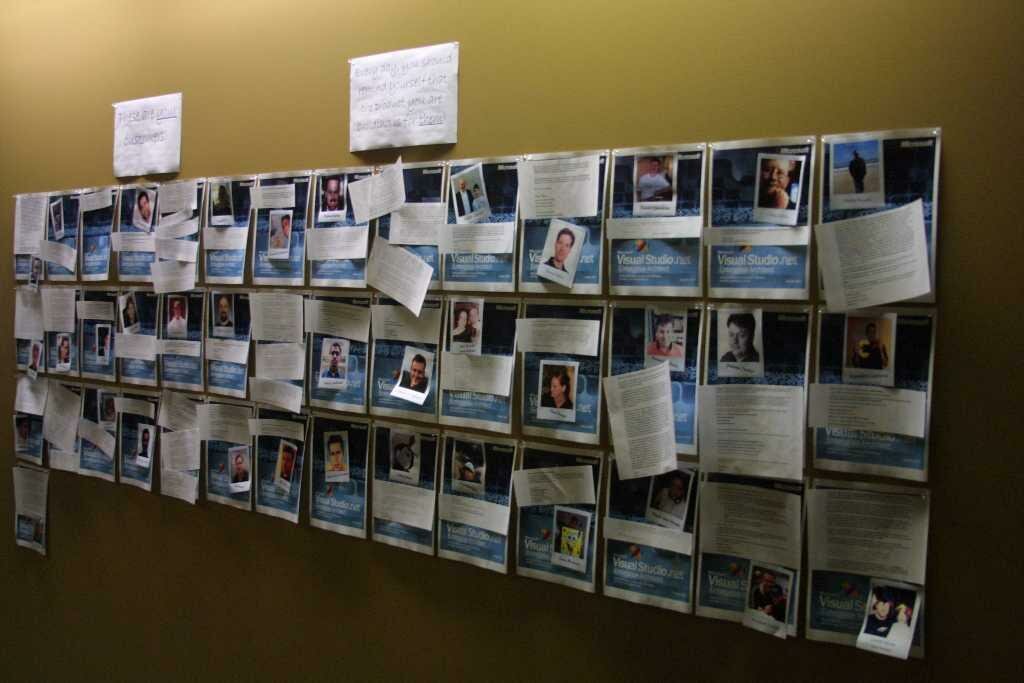May 27, 2004
How in the World Did I Not Know About This?
I just stumbled onto Browser Cam. Way, way cool.
MS Listens To Its Customers
Via chadr's blog customers on the wall in the VS.NET area. I've ranted before about MS needing to listen to its customers. Kudos, Chad, on proving that you do. Incidentally, I think my picture is the first one on the top row... :)
 (click for a larger image)
(click for a larger image)
May 26, 2004
Messing around with the iTunes SDK and the WMP Blogging Plugin
this post is a test of a tray application i whipped up to populate the registry keys used by the WMP blogging plugin with iTunes' current track information. this should enable w.bloggar to read my iTunes tracks and add it to my blog posts...
May 25, 2004
stream of consciousness
I was reading this post by Eric Lippert when I stumbled upon the statement that Software Engineering is an immature discipline. This triggered the stream of consciousness below:
Software Engineering is an immature discipline. Is it? What does that mean? Does it mean software engineering is a new discipline? How long have people been writing software? How long have people been working in the field of nuclear physics? Is nuclear physics an immature discipline? Is "maturity" not necessarily defined by age, but rather by degree of advancement? How to measure level of advancement? Is it measured by the number of important/meaningful/revolutionary discoveries? How to quantify important? Is it fair to continue the analogy to physics? Can software engineering advances impact humanity as a whole with the same magnitude as physics? Do we have specific curricula in the universities devoted to software engineering? Is there a shared body of knowledge? Are there industry certifications and accreditations? Are there professional organizations and standards bodies? What gives people the idea that software engineering is immature? Is it related to the simplicity of acquiring a "lab"?
The advances that have been realized in software engineering in the past quarter century have followed the trend to build layer of abstraction upon layer of abstraction and to simplify the interaction between software engineer and computer. We moved from machine languages and punch cards to Visual Basic and keyboards. Where will we be in 10 years? Will we be programming in English using microphones? Where will we be in 100 years? Will we have thought-controlled computational devices that compile and run high-quality software as we think of it? Will we be able to exchange ever-increasingly complex ideas with other humans? Will we be able to think of Power Point presentations and graphs and 3-D models of our ideas and wirelessly stream them to the person sitting in front of us who will then be able to view our thoughts and stream them back? What effect would this have on intellectual property rights? What new crimes will be enabled by these "advances" (thought rape) and what measures will be developed to counter them? Tangent. Back to my original question.
Is software engineering immature? I've seen this stated many times but is it true? My gut says no. Is it related to the rampant practice of hobbyists or novices being employed as engineers? I think this is part of the reason people have the perception that software engineering is immature: there are too many poor programmers and it is too easy to become a programer. Learn C++ in 21 days...shit. And Liberty's book was one of my favorite's back in the day! Maybe the problem is that only a small number of those that call themselves software engineers can keep up with the speed of advancement in software engineering and build upon prior experience to assimilate the new into better code. The rest just learn enough of the new to get by and the overall sophistication or elegance of their code doesn't improve despite the fact that the quality might given the ever-increasing amount of safeguards built in to modern platforms and frameworks. Garbage collection killed memory managment as a source of bugs for the most part. Something will come along to do the same for exception handling. Then conditional logic will get abstracted away. I digress again. I need Ginko or that shit for adult ADD. Wonder if the cable guy came out today. I don't have ADD, that was the mental equivalent of pre-emptive multitasking. I like that. New tagline for my blog.
May 19, 2004
Microsoft Speak
Whay do so many Microsofties preface every answer to a question with the word "so"? Watch any of the Channel 9 videos, or MSDN TV videos to see what I'm talking about, but it goes something like this:
Q: What are the implications of X with respect to the development of Y?
A: So, the way we approach this problem is....
I've noticed Scoble, Don Box, Chris Anderson, Bill Hill, Chris Sells, Brad Abrams, Sam Drucker, Euan Garden and Kam VedBrat doing this and I'm sure the practice is even more prevalent. Funny how corporate culture extends to speech patterns and just how sticky these habits become.
May 13, 2004
99 Bottles of Beer on the Wall
Warning only a geek would think this is cool.
99 Bootles of Beer on the Wall